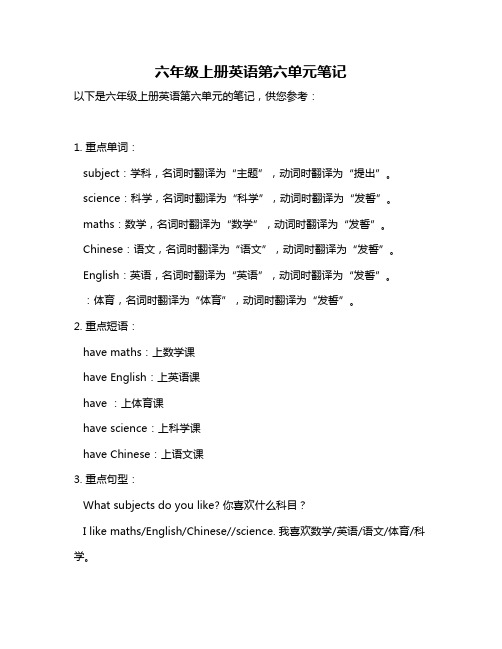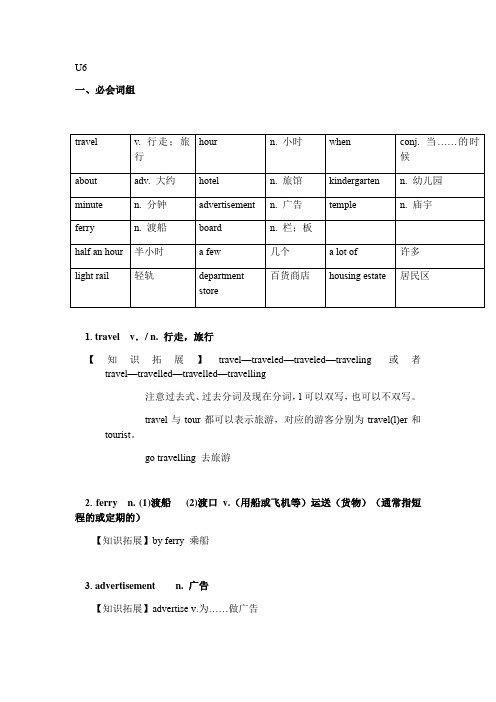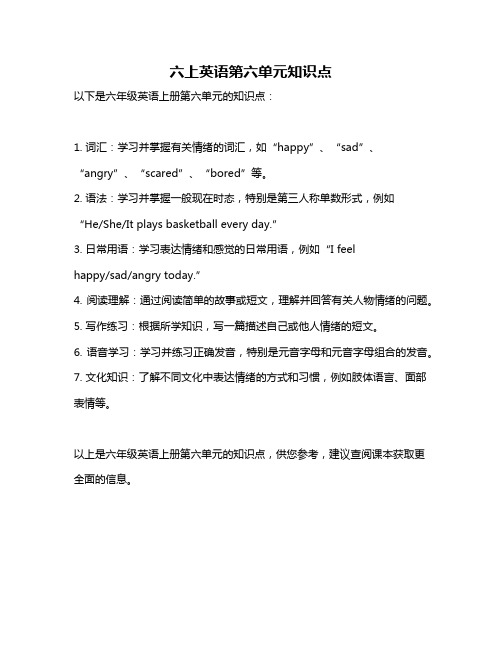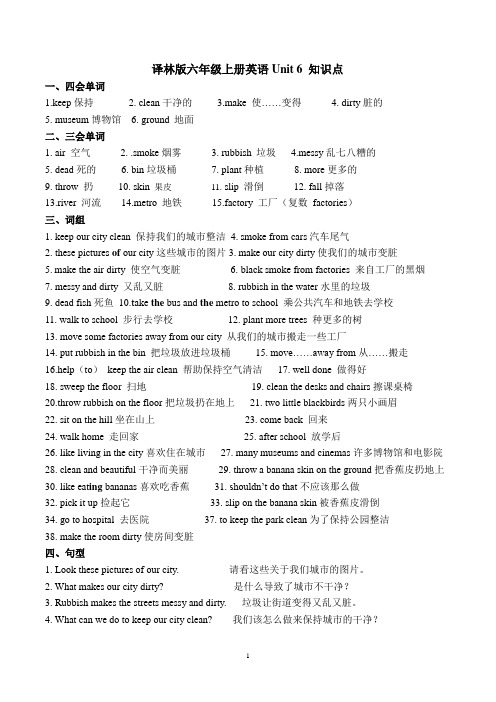六年级上册英语第六单元知识点
牛津英语六年级上册第6单元知识点归纳

Unit 6 Going to school1. traveling time to school 去学校行走时间2. it takes sb. some time to do sth. 某人花一段时间做某事3. It takes him about ten minutes. 他花大约十分钟。
4. half an hour 半小时5. go to sp. by ferry 乘渡船去某地6. go to school on foot=walk to school 步行去学校7. how long 多久8. get to sp. 到达某地9. get to the supermarket 到达超市10. get there/here/home 到达那儿/这儿/家里11. a restaurant 一个饭店12. a hotel 一个旅馆13. an advertisement board 一块广告牌14. a few + c.n. 几个;一些(后跟可数名词复数)15. a lot of + c.n. & u.n. 许多(后跟可数名词复数或不可数名词)16. on one’s way to school 在某人去某地的路上17. on my way to school 在我去学校的路上18. by light rail 乘轻轨19. department stores 百货商店20. go to kindergarten 上幼儿园语言点1. near 离…很近后面直接接地点I live near school.=My home is near school.我家离学校很近。
2. far away from=far from离…很远He lives far away from school.=His home is far from school.他家离学校很远3. by bus/bike/car/underground/train/ferry其他的交通工具都能用take来表示乘,但bike只能用ride take a bus/bike/car/underground/train/ferry ride a bikeHe goes to school by bus.=He takes a bus to school.He goes to school by bike.=He rides his/a bike to school.=He cycles to school. 4. on footShe goes to work on foot every day.=She walks to work every day.5. It takes sb. some time to do sth. 花费某人多少时间做某事。
六年级上册英语第六单元知识点

六年级上册英语第六单元知识点一.主要单词和短语a ngry生气 afraid害怕 sad伤心 worried担心 happy快乐wear穿 more更多 deep深 breath呼吸 popcorn爆米花make制作 wait等 check检查 planted种植(plant过去式) grow生长see a doctor看医生 take a deep breath深呼吸 count to ten 数到十a little worried有一点点担心be angry with…与。
生气be afraid of ... 害怕...... do more exercise做更多的运动wear warm clothes穿暖和的衣服 get some drinks拿一些饮料have some popcorn 吃一些爆米花 chase the mice追赶老鼠二.主要句子和知识点1. They are afraid of him. 他们害怕它。
be afraid of 意为“ 害怕某人”。
如: I am afraid of my English teacher. 我害怕我的英语老师。
2. The cat is angry with them. 这只猫很生它们的气。
be angry with意为“ 对某人生气”。
如: My mother is angry with me. 妈妈很生我的气。
3. What’s wrong?怎么啦?出什么事了?此句用于询问对方有什么问题或有什么不顺心的事情。
如:—What’s wrong, Jim? 吉姆,你怎么啦?— I am ill. 我生病了。
4.Your father is ill. 你爸爸生病了。
5.He should see a doctor this morning. 他今天早上应该去看病。
should 为情态动词,表示“应该,应当”。
此句用来给别人提建议。
如:He should work harder. 他应该更加努力。
六年级上册英语第六单元笔记

六年级上册英语第六单元笔记
以下是六年级上册英语第六单元的笔记,供您参考:
1. 重点单词:
subject:学科,名词时翻译为“主题”,动词时翻译为“提出”。
science:科学,名词时翻译为“科学”,动词时翻译为“发誓”。
maths:数学,名词时翻译为“数学”,动词时翻译为“发誓”。
Chinese:语文,名词时翻译为“语文”,动词时翻译为“发誓”。
English:英语,名词时翻译为“英语”,动词时翻译为“发誓”。
:体育,名词时翻译为“体育”,动词时翻译为“发誓”。
2. 重点短语:
have maths:上数学课
have English:上英语课
have :上体育课
have science:上科学课
have Chinese:上语文课
3. 重点句型:
What subjects do you like? 你喜欢什么科目?
I like maths/English/Chinese//science. 我喜欢数学/英语/语文/体育/科学。
4. 重点语法:
like后面加动词ing形式,表示喜欢做某事。
5. 重点提示:
学习重点词汇和短语,并尝试运用到日常对话中。
掌握询问别人喜欢什么科目的句型。
通过不断学习和练习,相信您能熟练掌握这个单元的内容,提升英语水平。
牛津上海版英语六年级上册Unit6知识点及语法点

U6一、必会词组1. travel v./ n. 行走,旅行【知识拓展】travel—traveled—traveled—traveling或者travel—travelled—travelled—travelling注意过去式、过去分词及现在分词,l可以双写,也可以不双写。
travel与tour都可以表示旅游,对应的游客分别为travel(l)er和tourist。
go travelling 去旅游2. ferry n. (1)渡船(2)渡口v.(用船或飞机等)运送(货物)(通常指短程的或定期的)【知识拓展】by ferry 乘船3. advertisement n. 广告【知识拓展】advertise v.为……做广告4. board n. 栏;板【知识拓展】abroad adv. 在国外,到国外。
broad adj. 宽广的。
形象记忆board这个单词:首尾bd两个字母想象成船头和船尾,中间oar是一个单词,意思是“桨”,所以board有“甲板,上船”的意思。
5. a few 几个。
a few只能修饰可数名词复数形式,与之对应的是a little, 只能修饰不可数名词。
练习:I.Read and complete the sentences.(根据给出的首字母,完成句子。
)1. I have been to Jing’an T .It's in the centre of Shanghai.2. My father’s office is far away from home. He goes to work by l r every morning because it is fast.3. Mum likes going to some department s at weekends.4. We live in a new h e . It's large and beautiful.keys: 1.Temple 2.1ight rail 3.stores 4.housing estate 【乘坐交通方式表达】乘坐交通工具的表达:by bus/by car/by underground/by bike/by plane/by ferry /on foot乘公共汽车/乘小汽车/乘地铁/骑自行车/乘飞机/乘轮渡/步行。
六上英语第六单元知识点

六上英语第六单元知识点
以下是六年级英语上册第六单元的知识点:
1. 词汇:学习并掌握有关情绪的词汇,如“happy”、“sad”、“angry”、“scared”、“bored”等。
2. 语法:学习并掌握一般现在时态,特别是第三人称单数形式,例如
“He/She/It plays basketball every day.”
3. 日常用语:学习表达情绪和感觉的日常用语,例如“I feel
happy/sad/angry today.”
4. 阅读理解:通过阅读简单的故事或短文,理解并回答有关人物情绪的问题。
5. 写作练习:根据所学知识,写一篇描述自己或他人情绪的短文。
6. 语音学习:学习并练习正确发音,特别是元音字母和元音字母组合的发音。
7. 文化知识:了解不同文化中表达情绪的方式和习惯,例如肢体语言、面部表情等。
以上是六年级英语上册第六单元的知识点,供您参考,建议查阅课本获取更全面的信息。
译林版六年级上册英语Unit 6 知识点归纳

译林版六年级上册英语Unit 6 知识点一、四会单词1.keep保持2. clean干净的3.make 使……变得4. dirty脏的5. museum博物馆6. ground地面二、三会单词1. air 空气2. .smoke烟雾3. rubbish垃圾4.messy乱七八糟的5. dead死的6. bin垃圾桶7. plant种植8. more更多的9. throw 扔10. skin果皮11. slip 滑倒12. fall掉落13.river 河流14.metro 地铁15.factory 工厂(复数factories)三、词组1. keep our city clean 保持我们的城市整洁4.smoke from cars汽车尾气2. these pictures of our city这些城市的图片3.make our city dirty使我们的城市变脏5.make the air dirty 使空气变脏6.black smoke from factories 来自工厂的黑烟7. messy and dirty 又乱又脏8. rubbish in the water水里的垃圾9. dead fish死鱼10.t ake the bus and the metro to school 乘公共汽车和地铁去学校11. walk to school 步行去学校12. plant more trees 种更多的树13. move some factories away from our city 从我们的城市搬走一些工厂14. put rubbish in the bin 把垃圾放进垃圾桶15. move……away from从……搬走16.help(to)keep the air clean 帮助保持空气清洁17. well done 做得好18. sweep the floor 扫地19. clean the desks and chairs擦课桌椅20.throw rubbish on the floor把垃圾扔在地上21. two little blackbirds两只小画眉22. sit on the hill坐在山上23. come back 回来24. walk home 走回家25. after school 放学后26. like living in the city喜欢住在城市27. many museums and cinemas许多博物馆和电影院28. clean and beautiful干净而美丽29. throw a banana skin on the ground把香蕉皮扔地上30. like eat ing bananas喜欢吃香蕉31. shouldn’t do that不应该那么做32. pick it up捡起它33. slip on the banana skin被香蕉皮滑倒34. go to hospital 去医院37. to keep the park clean为了保持公园整洁38. make the room dirty使房间变脏四、句型1. Look these pictures of our city. 请看这些关于我们城市的图片。
六年级英语上册U6知识点及习题

Unit 6 The secret to good health 【单词回顾】秘密_______ 简单的_______ 最少_______ 节食_______ 较少的________ 多油的_______ 最后地_________ 甚至_________微笑________ 至少__________ 保持一个良好的饮食习惯________________一、短语:take exercise, stay healthy, at least, keep a good diet…二、句型:1. First, get plenty of sleep.2. Don’t eat too much sweet or oily food.3. How old does Mr Li look?4. Get up early and go to bed early.三、重点精析:1. Keep a good diet. 保持一个良好的饮食习惯。
on diet 节食;减肥balanced diet 均衡饮食2. Eat more vegetables and less meat. 多吃蔬菜,少吃肉。
less是little的比较级less than 少于less and less 越来越少3. First, get plenty of sleep, at least 8 hours each night.首先,要有充足的睡眠,每晚至少有八个小时的睡眠。
分析:at least意思是“至少,不是少于”,是副词短语,可以修饰动词或整个句子,用来强调程度或数量。
4. Don’t eat too much sweet or oily food. 不要吃太多糖和油腻食物。
分析:这是一个否定祈使句。
祈使句是用来表达命令、请求、劝告、警告、禁止等语气的句子。
祈使句有以下几种类型:1)Do型----Do(表示行为的动词原形)+宾语+…Take the No.7 bus over there. Open the door.2)Be型----Be+名词/ 形容词+…Be quirt! Be careful.3)Let型----Let+宾语(通常是第一或第三人称宾格)+动词原形+…Let’s go home.4)Don’t型----Don’t+动词原形+…Don’t read in the sun.5)No型----No+名词或动词ing形式.No photos! No smoking!【巧记】祈使句句型口诀:祈使句,无主语,只用谓语就可以。
人教版六年级英语上册第六单元知识点归纳及复习题

人教版六年级英语上册第六单元知识点归纳及复习题Unit 6: How Do You Feel?Part AVocabulary:1.Adjectives: angry。
afraid。
ill。
worried。
happyn:A:Hey。
let's have some popcorn."Yum。
I'm so happy。
I love popcorn!"Here you are。
I'll go and get some drinks。
Wait for me."Hey。
where is my popcorn?"Yum。
It was so good."What。
How could you eat all the popcorn。
We should share!"Mum。
if I feel angry。
what should I do?"Well。
first。
take a deep breath。
Then you should count to ten."After that。
"After that。
XXX."Mum。
I XXX I count to ten。
too?"No。
dear。
you should see a doctor."1."Here you are!" is a partially XXX with a n adverb such as "here," "there," or "away," and the verb is "be," "come," or "go,"the XXX.In an inverted sentence。
- 1、下载文档前请自行甄别文档内容的完整性,平台不提供额外的编辑、内容补充、找答案等附加服务。
- 2、"仅部分预览"的文档,不可在线预览部分如存在完整性等问题,可反馈申请退款(可完整预览的文档不适用该条件!)。
- 3、如文档侵犯您的权益,请联系客服反馈,我们会尽快为您处理(人工客服工作时间:9:00-18:30)。
Unit 6 How do you feel ?
一、主要单词和短语
二、a ngry生气afraid害怕sad伤心worried担心happy快乐wear穿more更多deep深breath呼吸popcorn爆米花make制作wait等check检查planted种植(plant过去式) grow生长see a doctor看医生take a deep breath深呼吸count to ten 数到十
a little worried有一点点担心be angry with…与。
生气
be afraid of ... 害怕...... do more exercise做更多的运动
wear warm clothes穿暖和的衣服get some drinks拿一些饮料
have some popcorn 吃一些爆米花chase the mice追赶老鼠
二、主要句子和知识点
1、 They are afraid of him. 他们害怕它。
be afraid of 意为“ 害怕某人”。
如: I am afraid of my English teacher. 我害怕我的英语老师。
2、 The cat is angry with them. 这只猫很生它们的气。
be angry with意为“ 对某人生气”。
如: My mother is angry with me. 妈妈很生我的气。
3、What’s wrong?怎么啦?出什么事了?
此句用于询问对方有什么问题或有什么不顺心的事情。
如:—What’s wrong, Jim?吉姆,你怎么啦?
—I am ill. 我生病了。
4、Your father is ill. 你爸爸生病了。
5、5、He should see a doctor this morning. 他今天早上应该去看病。
6、should 为情态动词,表示“应该,应当”。
此句用来给别人提建议。
如:He should work harder. 他应该更加努力。
6、Don’t be sad. 别伤心。
Don’t be angry. 别生气。
7
如: What is he doing now? —He is working.
We are running now.
8、We should share. 我们应该分享。
9、What’s this cartoon about? 这部动画是关于什么的?
—It’s about a cat. 它是关于猫的。
10、How does Dad feel now? 爸爸现在感觉怎么样?
How do you feel now? 你现在感觉怎么样?
11、What should I do? 我应该做什么?
What should you do? 你应该做什么?。
